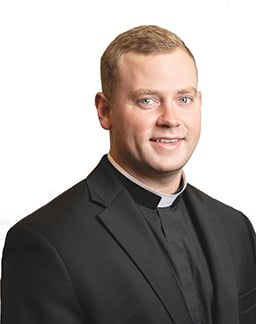The arduous good

Archbishop Fulton Sheen in his book, The Priest is Not His Own, states, “Once we understand that all trials come from the Lord, they lose their bitterness, and our heart is at peace.”
Archbishop Sheen is not saying God punishes His people through suffering. Rather, all our sufferings, trials, and temptations must pass before God’s vision before they are allowed. And if they are allowed, it is only because God has seen how He can weave salvation into our lives through them.
No suffering we endure is for naught. It has been allowed under God’s mysterious providence for the purpose of our good and our salvation. For this reason, in the depths of our world’s gloom, we confidently maintain hope.
St. Thomas Aquinas holds that the main difference between mere desire and the passion of hope is suffering. We desire tacos, we buy them easily, and we eat them. Desire satisfied. We do not hope for tacos.
We hope for state championships, for doctorate degrees, for well-adjusted and faithful children, for things that are “arduous, but possible to attain.” We accept the sacrifices and sufferings required to attain these arduous goods because we know the prize is worth it.
The virtue of hope, given to us at Baptism, works similarly to the passion of hope. However, this virtue moves us to yearn for the greatest and most arduous of all goods, God Himself. When we exercise this virtue, we move toward God in love despite the difficulty of the journey. In fact, the suffering, sacrifice, and perseverance required may even increase our hope as our struggles draw us more deeply into God.

For Christians, we cannot forget that our pilgrimage to God will at times be arduous. Scripture says, “In the world you will have trouble, but take courage, I have conquered the world” (Jn 16:33) and “Beloved, do not be surprised that a trial by fire is occurring among you, as if something strange were happening to you” (1 Pet 4:12). We are assured that true discipleship will bring exhaustion and suffering.
We cannot forget, however, the heroic lives of those who have hoped for the arduous good despite similar challenges. The prophet Habakkuk lived when Israel was profoundly unfaithful to God. He was thus plagued by discouragement and trial. Yet, he hoped.
Both Moses and Elijah reached such depths of anguish at certain moments in their ministries that they begged God to end their lives — Moses, from profound frustration with his people’s relentless idolatry, and Elijah because of sheer exhaustion in fighting against and running from a pagan queen. But they hoped. What kept them going was not merely the promise of God after death, but their relationship with Him now. Despite his trials, Habakkuk eventually says that even if things remain dark and bleak, “Yet will I rejoice in the Lord and exult in my saving God. God, my Lord, is my strength” (Hab 3:18-19).
To foster the virtue of hope in our lives, we cannot be surprised by our trials. We must see them as purifying opportunities for growth in virtue, as well as avenues to discover God on a more intimate level as sharers in the very cross of His Son. This is how James can say “Consider it all joy, my brothers, when you encounter various trials” (James 1:2), and Peter, “Rejoice to the extent that you share in the sufferings of Christ, so that when His glory is revealed you may also rejoice exultantly” (1 Pet 4:13).
Vocations to the priesthood and religious life are born in the families who teach their children this very lesson: the goal of Christian life is not ease or comfort, but the glory of knowing God. That in knowing Him, they love Him more deeply, and in loving Him, are willing to give all to follow Him and be living lights of hope in a dark world.
